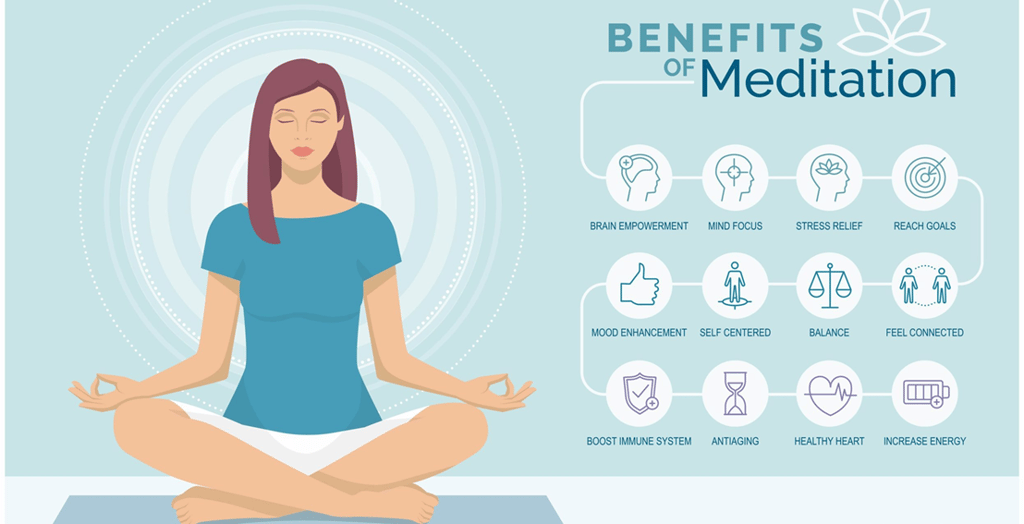
Unlock the Benefits of Meditation for Mental Clarity
Discover why the ancient practice of meditation is essential for modern wellness and mental wellbeing. Find out if meditation should be a part of your daily routine. Explore the benefits of meditation for improved mental clarity.
MEDITATIONMINDFULNESSANXIETYWELLNESS
Ever wondered why meditation is all the rage these days?
You've probably heard about its growing popularity, but you might be unsure about why it's so important. Meditation is more than just a trendy practice; it's a powerful tool that has an influence on your mental and physical well-being. From boosting self-awareness to managing stress, meditation offers a wide range of benefits that can transform your life.
In this article, we'll explore the ins and outs of meditation and why it's worth your time. You'll discover how this ancient practice can improve your mental health, sharpen your focus, and help you relax. We'll also delve into the physical perks of meditation, including stress relief and better overall health. By the end, you'll have a clear understanding of why people meditate and why you might want to give it a try yourself.
What is Meditation?
Meditation is a practice that involves focusing your mind to achieve a state of calm and clarity [1]. It's a technique that trains your mind to concentrate and redirect thoughts, often using your breath as an anchor [1]. You might think of meditation as something mystical, but it's simply a way to pause, breathe, and reset in our busy world [2].
Types of meditation
There are various types of meditation, each with its own unique approach:
Mindfulness meditation: This involves being fully present and aware of your surroundings without judgment [1] [3].
Transcendental meditation: You choose a mantra (a word, phrase, or sound) and repeat it for 20 minutes twice a day [3].
Guided meditation: Also known as visualization, this type is led by a guide or teacher who helps you form mental pictures of relaxing situations [3].
Loving-kindness meditation: This practice involves directing well-wishes toward others to evoke warm-hearted feelings [3].
Chakra meditation: This technique focuses on bringing balance to the chakras, often using visualization of colors associated with each chakra [3].
How to meditate
If you're new to meditation, here's a simple guide to get you started:
Find a quiet, comfortable place to sit [1].
Set a time limit, starting with 5-10 minutes if you're a beginner [1].
Notice your body and make sure you're in a stable position [1].
Feel your breath, focusing on the sensation as you breathe in and out [1].
Notice when your mind wanders, which is natural and expected [1].
Gently bring your attention back to your breath when you notice your mind has wandered [1].
Be kind to yourself and don't judge your wandering thoughts [1].
Remember, meditation is a skill that improves with practice. It's normal for your mind to wander, and the practice lies in noticing this and bringing your focus back [2]. To get the most benefit, try to make meditation a regular part of your daily routine [2].




Mental Health Benefits
Meditation offers a range of mental health benefits that can transform your daily life. By incorporating this practice into your routine, you can experience significant improvements in your overall well-being.
Reduces stress and anxiety
One of the most notable benefits of meditation is its ability to reduce stress and anxiety. When you meditate regularly, you give yourself a powerful tool to cope with life's challenges. It helps you develop a sense of calm, peace, and balance that can benefit your emotional well-being [4]. By focusing on something that calms you, you can learn to relax and manage stress more effectively [4].
Meditation has been shown to lower cortisol levels, which is the primary stress hormone [5]. This reduction in cortisol can lead to decreased anxiety and a greater sense of inner peace [1]. Even if you have a medical condition that's made worse by stress, adding meditation to your treatment plan might help you manage symptoms better [4].
Improves focus and concentration
Another significant benefit of meditation is its positive impact on your attention span and focus. Regular practice can help you stay centered and maintain your concentration for longer periods [1]. This improvement in focus can be particularly beneficial in today's fast-paced world, where distractions are constant.
Research has found that meditators perform faster on various tasks that require attention [2]. This enhanced cognitive function can help you in your daily life, whether you're at work, studying, or engaging in hobbies that require concentration.
Enhances emotional well-being
Meditation can also have a profound effect on your emotional health. It can help you gain a new perspective on stressful situations, increase self-awareness, and reduce negative emotions [4]. By practicing meditation, you can learn to stay present and respond to your feelings in a more balanced way.
Regular meditation has been linked to increased feelings of well-being, empathy, and positive emotions [5]. It can help you better understand yourself, find your best self, and increase positive feelings and actions toward others [1]. This emotional regulation can lead to improved relationships and a more positive outlook on life.
By incorporating meditation into your daily routine, you're not just giving yourself a moment of peace - you're investing in your long-term mental health and emotional well-being.
Physical Health Benefits
Meditation isn't just good for your mind; it also has significant benefits for your physical health. Let's explore some of the ways regular meditation practice can improve your overall well-being.
Lowers blood pressure
If you're concerned about your blood pressure, meditation might be a helpful addition to your health routine. Studies have shown that meditation techniques can lead to meaningful reductions in blood pressure, either on their own or alongside traditional medication [6].
Transcendental Meditation (TM) and Mindfulness-Based Stress Reduction (MBSR) have been particularly effective in lowering blood pressure. In one study, TM resulted in significant decreases in both systolic and diastolic blood pressure for men and women after just three months [6]. MBSR has also shown promise, with one study reporting a 4.9 mm Hg reduction in systolic blood pressure compared to other relaxation techniques [6].
These effects are believed to be linked to the relaxation response triggered by meditation. This response helps widen blood vessels and reduce inflammation, leading to better blood pressure control [7].
Improves sleep quality
If you're struggling with sleep, meditation might be the solution you're looking for. It's been shown to help people with insomnia and other sleep disturbances [8]. By calming your mind and body, meditation makes it easier to quiet those distracting thoughts that often keep you awake at night.
Meditation can also influence your body's natural sleep-wake cycle. It's been found to increase melatonin levels, the hormone that regulates sleep, leading to more restful nights [8]. Additionally, by reducing cortisol (the stress hormone), meditation helps create a more relaxed state conducive to sleep [8].
Boosts immune system
Perhaps one of the most surprising benefits of meditation is its positive impact on your immune system. Research has shown that even short periods of intense meditation can lead to significant changes in immune function [9].
A study found that after just eight days of meditation, there was increased activity in 220 genes directly related to immune response [9]. This included heightened activity in genes associated with interferon signaling, which plays a crucial role in your body's defense against viruses and cancer [9].
Interestingly, meditation activated 97% of interferon-response genes, compared to only 76% activation in mild COVID-19 patients and 31% in severe cases [9]. This suggests that regular meditation practice could potentially enhance your body's natural defense mechanisms.
By incorporating meditation into your daily routine, you're not just giving yourself a moment of calm – you're actively supporting your physical health in numerous ways.
Conclusion
Meditation has a profound influence on both mental and physical well-being, offering a wide array of benefits to enhance our lives. From reducing stress and anxiety to improving focus and emotional regulation, this ancient practice provides powerful tools to navigate our fast-paced world. What's more, meditation's positive effects extend to our physical health, helping to lower blood pressure, boost immune function, and improve sleep quality.
To sum up, incorporating meditation into your daily routine can lead to significant improvements in your overall health and quality of life. Whether you're looking to manage stress, sharpen your concentration, or simply find a moment of calm in your busy day, meditation offers a simple yet effective way to achieve these goals. By dedicating just a few minutes each day to this practice, you can tap into its transformative power and experience the benefits for yourself.
FAQs
1. What are ten scientifically proven benefits of meditation?
Meditation offers numerous health benefits, including: reducing stress, managing anxiety, aiding in depression management, lowering blood pressure, strengthening immune system health, improving memory, regulating mood, increasing self-awareness, and more.
2. Can you list twenty benefits of meditation related to brain health?
Meditation positively impacts the brain by slowing the aging process, particularly the thinning of the prefrontal cortex, enhancing attention, fostering increased innovation, improving problem-solving abilities, and aiding mental health conditions following trauma.
3. Why should one consider meditation as an important practice?
Meditation is vital as it provides a sense of calm, peace, and balance, enhancing both emotional well-being and overall health. It is also an effective tool for relaxation and stress management, helping individuals focus on calming elements and maintain inner peace.
4. What are five psychological advantages of practicing meditation?
Meditation offers significant psychological benefits, such as promoting calmness, enhancing insight for those prone to anxiety, and supporting emotional awareness. It also cultivates qualities like kindness, compassion, sympathetic joy, and mental calmness, even in challenging situations.
References
[1] - https://health.ucdavis.edu/blog/cultivating-health/10-health-benefits-of-meditation-and-how-to-focus-on-mindfulness-and-compassion/2022/12
[2] - https://www.ncbi.nlm.nih.gov/pmc/articles/PMC4895748/
[3] - https://www.everydayhealth.com/meditation/types/
[4] - https://www.mayoclinic.org/tests-procedures/meditation/in-depth/meditation/art-20045858
[5] - https://www.calm.com/blog/focused-meditation
[6] - https://www.ncbi.nlm.nih.gov/pmc/articles/PMC3303565/
[7] - https://www.health.harvard.edu/heart-health/meditation-and-a-relaxation-technique-to-lower-blood-pressure
[8] - https://www.floridamedicalclinic.com/blog/meditate-before-bed/
[9] - https://ufhealth.org/news/2021/meditation-brings-robust-immune-system-activation-uf-health-researchers-find
Copyright © 2025 Djedi Living. All rights reserved.
Disclaimer
This site is not intended to provide and does not constitute medical, legal, or other professional advice. The content on DjediLiving.com is designed to support, not replace, medical or psychiatric treatment. Please seek professional care if you believe you may have a condition.
DjediLiving.com may earn affiliate income from qualifying purchases.
Before using the site, please read our












